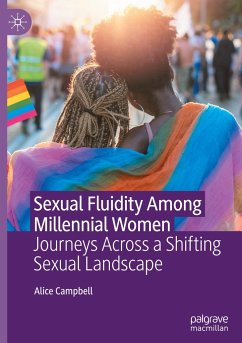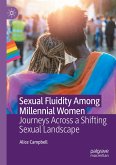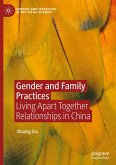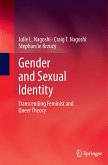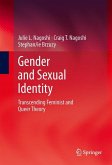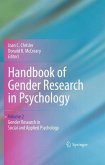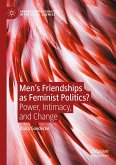- Gebundenes Buch
- Merkliste
- Auf die Merkliste
- Bewerten Bewerten
- Teilen
- Produkt teilen
- Produkterinnerung
- Produkterinnerung
Drawing on data collected from over 8,000 millennial women in Australia, this book proposes a new theory of women's sexual identity that accounts for various sociocultural, historical, and interactional factors that inform women's sexualities. The author provides a new model for understanding changes in sexual identity among women. Each new chapter focuses on a new aspect of their model: the contemporary context in which women are navigating sexual identities; sexual landscapes and the degree of heteronormativity that characterizes various sexual landscapes; experiences of sexual violence and…mehr
Andere Kunden interessierten sich auch für
![Sexual Fluidity Among Millennial Women Sexual Fluidity Among Millennial Women]() Alice CampbellSexual Fluidity Among Millennial Women74,99 €
Alice CampbellSexual Fluidity Among Millennial Women74,99 €![Gender and Family Practices Gender and Family Practices]() Shuang QiuGender and Family Practices88,99 €
Shuang QiuGender and Family Practices88,99 €![Gender and Family Practices Gender and Family Practices]() Shuang QiuGender and Family Practices88,99 €
Shuang QiuGender and Family Practices88,99 €![Gender and Sexual Identity Gender and Sexual Identity]() Julie L. NagoshiGender and Sexual Identity74,99 €
Julie L. NagoshiGender and Sexual Identity74,99 €![Gender and Sexual Identity Gender and Sexual Identity]() Julie L. NagoshiGender and Sexual Identity74,99 €
Julie L. NagoshiGender and Sexual Identity74,99 €![Handbook of Gender Research in Psychology Handbook of Gender Research in Psychology]() Handbook of Gender Research in Psychology162,99 €
Handbook of Gender Research in Psychology162,99 €![Men¿s Friendships as Feminist Politics? Men¿s Friendships as Feminist Politics?]() Klara GoedeckeMen¿s Friendships as Feminist Politics?88,99 €
Klara GoedeckeMen¿s Friendships as Feminist Politics?88,99 €-
-
-
Drawing on data collected from over 8,000 millennial women in Australia, this book proposes a new theory of women's sexual identity that accounts for various sociocultural, historical, and interactional factors that inform women's sexualities. The author provides a new model for understanding changes in sexual identity among women. Each new chapter focuses on a new aspect of their model: the contemporary context in which women are navigating sexual identities; sexual landscapes and the degree of heteronormativity that characterizes various sexual landscapes; experiences of sexual violence and their potential associations with the sexual trajectories of women; and the potential health and wellbeing implications of changes in sexual identity. Taken as a whole, this text challenges the essentialist framing of the "species" narrative in favor of a more nuanced and socially situated analysis of women's sexualities throughout the life course.
This monograph will be of interestto scholars and students in sociology, gender and sexuality studies, and psychology.
This monograph will be of interestto scholars and students in sociology, gender and sexuality studies, and psychology.
Produktdetails
- Produktdetails
- Verlag: Palgrave Macmillan / Springer International Publishing / Springer, Berlin
- Artikelnr. des Verlages: 978-3-031-13649-8
- 1st ed. 2022
- Seitenzahl: 252
- Erscheinungstermin: 25. September 2022
- Englisch
- Abmessung: 216mm x 153mm x 19mm
- Gewicht: 443g
- ISBN-13: 9783031136498
- ISBN-10: 3031136497
- Artikelnr.: 64279983
- Verlag: Palgrave Macmillan / Springer International Publishing / Springer, Berlin
- Artikelnr. des Verlages: 978-3-031-13649-8
- 1st ed. 2022
- Seitenzahl: 252
- Erscheinungstermin: 25. September 2022
- Englisch
- Abmessung: 216mm x 153mm x 19mm
- Gewicht: 443g
- ISBN-13: 9783031136498
- ISBN-10: 3031136497
- Artikelnr.: 64279983
Alice Campbell is a sociologist and research fellow in the Life Course Centre at the University of Queensland. Alice's research examines the ways in which women's lives are structured by the intersecting forces of heteropatriarchy and neoliberalism, and the production of inequalities by sexual identity and gender.
1 The Compass.- Sexual Orientation and Sexual Identity: Definitions and Narratives.- The Context for This Book.-Research Questions.- Some Caveats.- A Map of This Book.-Conclusion.- References.- 2 Theorizing Sexual Identity Change.-Theoretical Foundations.- A Biopsychosocial Model.- Biological Factors.-Psychological Factors.- Social Factors.- Individual Agency.-A Note on "Choice" and Immutability.- Pathways to Sexual Identity Change.- Sexual Identity Development.-Fluid Desires.- Motivated Realignment.- Outcomes of Sexual Identity Change.-A Note About Sex/Gender Differences.- Conclusion.- References.-3 Operationalizing Sexual Identity Change.- Surveying the Data Landscape.- The International Data Landscape.-The Australian Data Landscape.- The Australian Longitudinal Study on Women's Health.- Study Background.-Sexual Identity in the ALSWH.- Operationalizing Sexual Identity Change.- Conclusion.-References.- 4 From Gen X to Millennials: Generational Differences in Sexual Fluidity.- Changes in Women's Sexual Identities Over Biographical Time.-Changes in Women's Sexual Identities Over Historical Time.- Bringing the Two Temporal Dimensions Together.- Sexual Fluidity Among Emerging Adults.- Methods.- Measures.- Statistical Analyses.-Results.- Describing Patterns of Sexual Identity Change.- Testing Cohort Differences in Sexual Fluidity During Emerging Adulthood.-Discussion.- Cohort Effects.- Conclusion.-References.- 5 Social Location, Heteronormative Pressure, and Sexual Fluidity.- The Life Course-Sexual Landscape Model.-Multiple Pathways to Sexual Identity Change.- A Biopsychosocial Model of Sexual Identity.- The Sexual Landscape.-Empirical Evidence.- Millennial Women's Positions on the Sexual Landscape.- Age.-Country of Birth.- University Attendance.- Household Context.-Geographic Context.- Marriage and Motherhood.- Agency and Causality.-Hypothesis.- Methods.- Measures.-Statistical Analyses.- Results.- Changes in a More Same-Sex-Oriented Direction.-Changes in a Less Same-Sex-Oriented Direction.- Results from Stratified Models.- Discussion.-Aspirations for Marriage and Motherhood.- Predicting Changes at Each End of the Sexual Identity Continuum.- Implications.-Limitations and Directions for Future Research.- Conclusion.- References.-6 Sexual Fluidity and Women's Psychological Distress.- Intrapersonal Sources of Distress.- Social Sources of Distress.-Summary of Theoretical Arguments.- Empirical Evidence.- Examining Changes Cumulatively.-Accounting for the Direction of Change.- Summary of the Evidence.- The Current Study.-Methods.- Measures.- Statistical Analyses.-Results.- Sexual Identity Change and Psychological Distress.- Cumulative Changes, Sexual Identity Trajectories, and Psychological Distress.-Discussion.- Cumulative Changes and Identity Trajectories.- Sexual Identity Questioning and Ambiguity.-Limitations and Directions for Future Research.- Conclusion.- References.-7 Heteropatriarchy, Sexual Violence, and Sexual Fluidity.- Sexual Violence Against Queer Women.- Heteropatriarchal Rape Culture.-Intersecting Axes of Power and Subordination.- Prejudice, Predation, and Punishment.- Prejudice.-Predation.- Punishment.- A "Welcome Effect" of Sexual Violence?.-Mechanisms Linking Sexual Victimization to Queer Identification.- The Current Study.- Hypotheses.-Methods.- Measures.- Statistical Analyses.-Results.- Changes in Sexual Identity Predicting Sexual Victimization Risk.- Sexual Victimization as a Predictor of Changes in Sexual Identity.- Discussion.- Limitations and Directions for Future Research.- Conclusion.-References.- 8 Conclusion.- Summary of Key Findings.-Implications.- Theories of Sexual Identity and Fluidity.- Collection and Analysis of Longitudinal Survey Data on Sexual Identity.-Provision of Services to Sexual Minority Women.- Structural Reform.- Limitations and Directions for Future Research.-Concluding Remarks.- References.- Appendix.
1 The Compass.- Sexual Orientation and Sexual Identity: Definitions and Narratives.- The Context for This Book.-Research Questions.- Some Caveats.- A Map of This Book.-Conclusion.- References.- 2 Theorizing Sexual Identity Change.-Theoretical Foundations.- A Biopsychosocial Model.- Biological Factors.-Psychological Factors.- Social Factors.- Individual Agency.-A Note on "Choice" and Immutability.- Pathways to Sexual Identity Change.- Sexual Identity Development.-Fluid Desires.- Motivated Realignment.- Outcomes of Sexual Identity Change.-A Note About Sex/Gender Differences.- Conclusion.- References.-3 Operationalizing Sexual Identity Change.- Surveying the Data Landscape.- The International Data Landscape.-The Australian Data Landscape.- The Australian Longitudinal Study on Women's Health.- Study Background.-Sexual Identity in the ALSWH.- Operationalizing Sexual Identity Change.- Conclusion.-References.- 4 From Gen X to Millennials: Generational Differences in Sexual Fluidity.- Changes in Women's Sexual Identities Over Biographical Time.-Changes in Women's Sexual Identities Over Historical Time.- Bringing the Two Temporal Dimensions Together.- Sexual Fluidity Among Emerging Adults.- Methods.- Measures.- Statistical Analyses.-Results.- Describing Patterns of Sexual Identity Change.- Testing Cohort Differences in Sexual Fluidity During Emerging Adulthood.-Discussion.- Cohort Effects.- Conclusion.-References.- 5 Social Location, Heteronormative Pressure, and Sexual Fluidity.- The Life Course-Sexual Landscape Model.-Multiple Pathways to Sexual Identity Change.- A Biopsychosocial Model of Sexual Identity.- The Sexual Landscape.-Empirical Evidence.- Millennial Women's Positions on the Sexual Landscape.- Age.-Country of Birth.- University Attendance.- Household Context.-Geographic Context.- Marriage and Motherhood.- Agency and Causality.-Hypothesis.- Methods.- Measures.-Statistical Analyses.- Results.- Changes in a More Same-Sex-Oriented Direction.-Changes in a Less Same-Sex-Oriented Direction.- Results from Stratified Models.- Discussion.-Aspirations for Marriage and Motherhood.- Predicting Changes at Each End of the Sexual Identity Continuum.- Implications.-Limitations and Directions for Future Research.- Conclusion.- References.-6 Sexual Fluidity and Women's Psychological Distress.- Intrapersonal Sources of Distress.- Social Sources of Distress.-Summary of Theoretical Arguments.- Empirical Evidence.- Examining Changes Cumulatively.-Accounting for the Direction of Change.- Summary of the Evidence.- The Current Study.-Methods.- Measures.- Statistical Analyses.-Results.- Sexual Identity Change and Psychological Distress.- Cumulative Changes, Sexual Identity Trajectories, and Psychological Distress.-Discussion.- Cumulative Changes and Identity Trajectories.- Sexual Identity Questioning and Ambiguity.-Limitations and Directions for Future Research.- Conclusion.- References.-7 Heteropatriarchy, Sexual Violence, and Sexual Fluidity.- Sexual Violence Against Queer Women.- Heteropatriarchal Rape Culture.-Intersecting Axes of Power and Subordination.- Prejudice, Predation, and Punishment.- Prejudice.-Predation.- Punishment.- A "Welcome Effect" of Sexual Violence?.-Mechanisms Linking Sexual Victimization to Queer Identification.- The Current Study.- Hypotheses.-Methods.- Measures.- Statistical Analyses.-Results.- Changes in Sexual Identity Predicting Sexual Victimization Risk.- Sexual Victimization as a Predictor of Changes in Sexual Identity.- Discussion.- Limitations and Directions for Future Research.- Conclusion.-References.- 8 Conclusion.- Summary of Key Findings.-Implications.- Theories of Sexual Identity and Fluidity.- Collection and Analysis of Longitudinal Survey Data on Sexual Identity.-Provision of Services to Sexual Minority Women.- Structural Reform.- Limitations and Directions for Future Research.-Concluding Remarks.- References.- Appendix.

